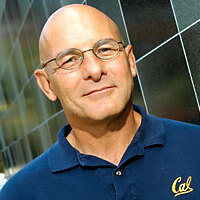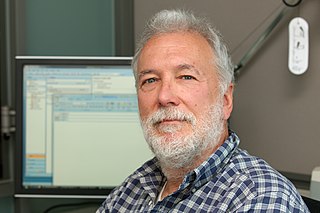Related Research Articles

John William Mauchly was an American physicist who, along with J. Presper Eckert, designed ENIAC, the first general-purpose electronic digital computer, as well as EDVAC, BINAC and UNIVAC I, the first commercial computer made in the United States.

John Edward Hopcroft is an American theoretical computer scientist. His textbooks on theory of computation and data structures are regarded as standards in their fields. He is a professor emeritus at Cornell University, co-director of the Center on Frontiers of Computing Studies at Peking University, and the director of the John Hopcroft Center for Computer Science at Shanghai Jiao Tong University.

David Andrew Patterson is an American computer pioneer and academic who has held the position of professor of computer science at the University of California, Berkeley since 1976. He announced retirement in 2016 after serving nearly forty years, becoming a distinguished software engineer at Google. He currently is vice chair of the board of directors of the RISC-V Foundation, and the Pardee Professor of Computer Science, Emeritus at UC Berkeley.

Jack Bonnell Dennis is an American computer scientist and Emeritus Professor of Computer Science and Engineering at Massachusetts Institute of Technology.

Yale Nance Patt is an American professor of electrical and computer engineering at The University of Texas at Austin. He holds the Ernest Cockrell, Jr. Centennial Chair in Engineering. In 1965, Patt introduced the WOS module, the first complex logic gate implemented on a single piece of silicon. He is a fellow of both the Institute of Electrical and Electronics Engineers and the Association for Computing Machinery, and in 2014 he was elected to the National Academy of Engineering.
The Eckert–Mauchly Award recognizes contributions to digital systems and computer architecture. It is known as the computer architecture community’s most prestigious award. First awarded in 1979, it was named for John Presper Eckert and John William Mauchly, who between 1943 and 1946 collaborated on the design and construction of the first large scale electronic computing machine, known as ENIAC, the Electronic Numerical Integrator and Computer. A certificate and $5,000 are awarded jointly by the Association for Computing Machinery (ACM) and the IEEE Computer Society for outstanding contributions to the field of computer and digital systems architecture.
Giovanni De Micheli is a research scientist in electronics and computer science. He is credited for the invention of the Network on a Chip design automation paradigm and for the creation of algorithms and design tools for Electronic Design Automation (EDA). He is Professor and Director of the Integrated Systems laboratory at École Polytechnique Fédérale de Lausanne (EPFL), Switzerland. Previously, he was Professor of Electrical Engineering at Stanford University. He was Director of the Electrical Engineering Institute at EPFL from 2008 to 2019 and program leader of the Swiss Federal Nano-Tera.ch program. He holds a Nuclear Engineer degree, a M.S. and a Ph.D. degree in Electrical Engineering and Computer Science under Alberto Sangiovanni-Vincentelli.
David J. Kuck, a graduate of the University of Michigan, was a professor in the Computer Science Department the University of Illinois at Urbana-Champaign from 1965 to 1993. He is the father of Olympic silver medalist Jonathan Kuck. While at the University of Illinois at Urbana-Champaign he developed the Parafrase compiler system (1977), which was the first testbed for the development of automatic vectorization and related program transformations. In his role as Director (1986–93) of the Center for Supercomputing Research and Development (CSRD-UIUC), Kuck led the construction of the CEDAR project, a hierarchical shared-memory 32-processor SMP supercomputer completed in 1988 at the University of Illinois.

Mark A. Horowitz is an American electrical engineer, computer scientist, inventor, and entrepreneur who is the Yahoo! Founders Professor in the School of Engineering and the Fortinet Founders Chair of the Department of Electrical Engineering at Stanford University. He holds a joint appointment in the Electrical Engineering and Computer Science departments and previously served as the Chair of the Electrical Engineering department from 2008 to 2012. He is a co-founder, the former chairman, and the former chief scientist of Rambus Inc.. Horowitz has authored over 700 published conference and research papers and is among the most highly-cited computer architects of all time. He is a prolific inventor and holds 374 patents as of 2023.

James Richard "Jim" Goodman retired as professor of computer science at the University of Auckland in Auckland, New Zealand, and emeritus professor at the University of Wisconsin–Madison.
The Harry H. Goode Memorial Award is an IEEE Computer Society annual awards in honor of Harry H. Goode for achievements in the information processing field which are considered either a single contribution of theory, design, or technique of outstanding significance, or the accumulation of important contributions on theory or practice over an extended time period, the total of which represent an outstanding contribution.
Josep Torrellas is Professor and Willett Faculty Scholar in the Department of Computer Science and a research faculty for the Universal Parallel Computing Research Center at the University of Illinois Urbana–Champaign. Torrellas's research area is computer architecture, focusing on speculative multithreading, multiprocessor organization, integration of processors and memory, and architectural support for software debuggability and machine reliability. He has been involved in the Stanford DASH and the Illinois Cedar multiprocessor projects, and led the Illinois Aggressive COMA and FlexRAM Intelligent Memory projects.

Mateo Valero Cortés is a Spanish computer architect. His research encompasses different concepts within the field of computer architecture, a discipline in which he has published more than 700 papers in journals, conference proceedings and books. Valero has received numerous awards, including the Eckert–Mauchly Award in 2007, for "extraordinary leadership in building a world class computer architecture research center, for seminal contributions in the areas of vector computing and multithreading, and for pioneering basic new approaches to instruction-level parallelism." He is the director of the Barcelona Supercomputing Center, which hosts the MareNostrum supercomputer.

Oyekunle Ayinde "Kunle" Olukotun is a British-born Nigerian computer scientist who is the Cadence Design Systems Professor of the Stanford School of Engineering, Professor of Electrical Engineering and Computer Science at Stanford University and the director of the Stanford Pervasive Parallelism Lab. Olukotun is known as the “father of the multi-core processor”, and the leader of the Stanford Hydra Chip Multiprocessor research project. Olukotun's achievements include designing the first general-purpose multi-core CPU, innovating single-chip multiprocessor and multi-threaded processor design, and pioneering multicore CPUs and GPUs, transactional memory technology and domain-specific languages programming models. Olukotun's research interests include computer architecture, parallel programming environments and scalable parallel systems, domain specific languages and high-level compilers.
Susan J. Eggers is an American computer scientist noted for her research on computer architecture and compilers.
Daniel P. Siewiorek is an American computer engineer and computer scientist, currently the Buhl University Professor Emeritus of Electrical and Computer Engineering and Computer Science at Carnegie Mellon University.
Mark D. Hill is a computer scientist and professor at the University of Wisconsin–Madison. He has been cited over 27,000 times.
Norman Paul Jouppi is an American electrical engineer and computer scientist.
Trevor Mudge is a computer scientist, academic and researcher. He is the Bredt Family Chair of Computer Science and Engineering, and Professor of Electrical Engineering and Computer Science at the University of Michigan.
James E. Thornton was an American computer engineer.
References
- ↑ "Edward S. Davidson". Electrical Engineering and Computer Science. University of Michigan. Retrieved 26 January 2011.
- ↑ "1992 Harry H. Goode Memorial Award Recipient". IEEE Computer Society. Archived from the original on 26 December 2010. Retrieved 26 January 2011.
- ↑ "Edward S. Davidson - 2000 Eckert-Mauchly Award Recipient". IEEE Computer Society. Archived from the original on 11 October 2012. Retrieved 26 January 2011.